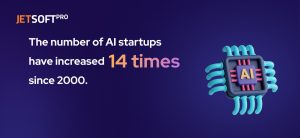In today’s digital age, technology is advancing at an unprecedented pace. New frameworks, tools, and methodologies emerge regularly, revolutionizing the software development landscape. For startups, staying updated with the latest trends is not just a choice but a necessity for survival and growth.
- Evolving Customer Expectations: Customers today have higher expectations when it comes to software products and services. They seek seamless user experiences, personalized solutions, and quick responsiveness. Startups need to leverage the latest technologies to meet these evolving customer demands and gain a competitive edge.
- Market Disruption: Technology-driven disruptions are reshaping industries at an accelerated pace. Startups that fail to adapt to these disruptions risk being left behind. By staying updated with emerging software development trends, startups can identify opportunities for innovation, streamline processes, and disrupt traditional business models.
- Enhanced Efficiency and Productivity: New technologies and methodologies often offer improved efficiency and productivity gains for startups. For example, low-code and no-code development platforms allow startups to rapidly develop and deploy applications without extensive coding knowledge. By leveraging these platforms, startups can streamline development cycles, reduce time-to-market, and allocate resources more effectively.
- Competitive Advantage: Being at the forefront of technology gives startups a competitive advantage in the market. By adopting cutting-edge software development trends, startups can differentiate themselves from competitors, attract investors, and capture a larger market share. Staying updated also enables startups to align their offerings with emerging market demands and customer preferences.
- Cost Optimization: Adopting the latest software development trends can help startups optimize costs. For instance, cloud-native development allows startups to leverage cost-effective cloud infrastructure, scale resources as needed, and reduce hardware and maintenance expenses. Similarly, automation through DevOps and CI/CD practices saves time, reduces human errors, and lowers operational costs.
- Talent Attraction and Retention: Top talent in the software development field is often attracted to startups that embrace cutting-edge technologies. By staying updated with the latest trends, startups can position themselves as innovative and forward-thinking organizations, attracting skilled developers who are eager to work with the latest tools and frameworks.
To stay ahead in a fiercely competitive market, startups must stay updated with the latest trends and leverage them strategically to meet customer expectations, drive innovation, and gain a competitive edge. In this article, we will explore the top five software development trends that startups should pay attention to in 2023. From low-code and no-code development to the transformative power of artificial intelligence and machine learning, we will delve into the key trends that will shape the software development landscape for startups in the coming year. By understanding and embracing these trends, startups can position themselves for success and navigate the dynamic and ever-changing technological landscape with confidence.
Trend 1: Low-code and no-code development
Low-code and no-code platforms have gained significant popularity among startups. These platforms allow developers and non-technical users to create applications with minimal coding knowledge. By using visual interfaces and pre-built components, startups can accelerate their development processes and deliver software solutions more rapidly.
Advantages of low-code and no-code platforms
- Faster development: Low-code and no-code platforms drastically reduce the development time by eliminating the need for extensive coding and programming. Startups can rapidly prototype, iterate, and deploy applications, resulting in faster time-to-market.
- Increased productivity: With a visual interface and pre-built components, low-code and no-code platforms empower developers and non-technical users to focus on the core functionality of the application. This streamlines development efforts, enhances productivity, and allows teams to deliver more value in less time.
- Reduced dependency on technical expertise: Startups often face challenges in hiring and retaining highly skilled developers. Low-code and no-code platforms alleviate this dependency on technical expertise, enabling startups to tap into the potential of their existing team members or non-technical individuals to build functional and user-friendly applications.

Examples of popular low-code and no-code platforms and how startups are leveraging them
- Mendix is a leading low-code platform that empowers startups to build enterprise-grade applications with speed and efficiency. Startups leverage Mendix to create customized applications for various industries, such as finance, healthcare, and manufacturing, without extensive coding knowledge.
- Bubble is a prominent no-code platform that enables startups to develop web and mobile applications through a visual interface. Startups utilize Bubble to create interactive prototypes, build Minimum Viable Products (MVPs), and validate their ideas quickly and cost-effectively.
- OutSystems offers a comprehensive low-code development platform that caters to the needs of startups looking to build complex, scalable applications. Startups leverage OutSystems’ visual development environment and pre-built connectors to accelerate their development cycles and enhance collaboration between technical and non-technical teams.
Low-code and no-code development platforms have ushered in a new era of efficiency, collaboration, and innovation for startups. Learn more about Low-code/No-code development in our article: Low-Code Magic Empowering Startups for Success. By reducing the dependency on extensive coding, these platforms empower startups to develop applications faster, increase productivity, and tap into the potential of their existing resources.
Trend 2: Artificial Intelligence (AI) and Machine Learning (ML)
AI and ML continue to be prominent trends in software development. Startups are leveraging AI and ML technologies to enhance user experiences, automate tasks, and gain insights from large amounts of data. These technologies are being utilized in various domains, such as natural language processing, computer vision, and predictive analytics, to provide innovative solutions and drive business growth. With the ability to process vast amounts of data and derive valuable insights, AI and ML technologies are driving innovation, improving user experiences, automating tasks, and empowering startups to make data-driven decisions.
The growing role of AI and ML in software development for startups
The role of AI and ML in software development for startups is rapidly growing, opening up new avenues of innovation and possibilities. AI-powered software development provides startups with powerful tools to analyze complex data, optimize processes, and create intelligent applications. By leveraging predictive analytics software, startups can make data-driven decisions, identify patterns, and uncover valuable insights that drive business growth.
Moreover, AI-based chatbots are revolutionizing customer support and engagement for startups. These intelligent chatbots can understand and respond to user queries, provide personalized recommendations, and streamline customer interactions. By automating routine tasks and providing efficient customer service, startups can enhance user experiences and improve customer satisfaction.
Furthermore, AI and ML technologies enable startups to embrace intelligent automation software. By automating repetitive and time-consuming tasks, startups can free up resources and focus on more strategic initiatives. Intelligent automation can streamline internal processes, optimize workflows, and improve overall operational efficiency.
The integration of AI and ML in software development empowers startups to drive innovation and deliver groundbreaking products and services to the market. These technologies offer the potential to solve complex problems, improve decision-making, and create highly adaptable applications that continuously learn and evolve. Startups that harness the power of AI and ML gain a competitive edge, as they can rapidly adapt to changing market dynamics and provide unique solutions that meet the evolving needs of their customers.
By leveraging AI-powered software development, predictive analytics software, AI-based chatbots, and intelligent automation software, startups can unlock new possibilities, drive innovation, and create impactful solutions that propel their growth and success in the digital age.
Real-world examples of startups implementing AI and ML technologies
- Grammarly, a startup specializing in writing assistance, utilizes AI and ML algorithms to provide real-time grammar and spelling corrections. The platform employs natural language processing techniques to understand context and deliver accurate suggestions, enhancing the writing experience for millions of users.
- UiPath, a leading robotic process automation startup, employs ML algorithms to automate repetitive tasks. By mimicking human interactions with software systems, UiPath’s robots streamline workflows, reduce errors, and improve operational efficiency for organizations across industries.
- DataRobot, a machine learning automation platform, enables startups to build predictive models without extensive data science expertise. By automating the end-to-end ML process, DataRobot empowers startups to leverage the power of ML for tasks such as customer segmentation, fraud detection, and demand forecasting.
AI and ML have become indispensable tools in the arsenal of startups, transforming the landscape of software development. By harnessing the power of these technologies, startups can enhance user experiences, automate tasks, and gain valuable insights from data. As AI and ML continue to evolve and advance, startups that embrace these technologies and leverage them strategically will be at the forefront of innovation, empowering them to thrive in an increasingly competitive market. If you have an interest in AI technologies within software development and how they can elevate the daily tasks of the typical software engineer, we invite you to peruse our article. In it, we explore the question of whether AI might one day replace human developers.
Trend 3: Cloud-native development
Startups are increasingly adopting cloud-native development practices to build scalable and resilient applications. Cloud-native architectures enable the development and deployment of applications in a distributed environment, leveraging microservices, containers, and container orchestration platforms like Kubernetes. This approach allows startups to optimize resource utilization, improve scalability, and achieve greater agility in their software development processes. 
Advantages for Startups
- Scalability: Cloud-native development allows startups to seamlessly scale their applications based on demand. By leveraging the elasticity of cloud infrastructure, startups can quickly adapt their resources to handle fluctuating workloads and effectively manage growth.
- Resilience: Cloud-native applications are built with resilience in mind. By adopting distributed architectures and fault-tolerant design patterns, startups can ensure that their applications remain available and resilient even in the face of failures.
- Cost-efficiency: Cloud-native development enables startups to optimize costs by leveraging cloud infrastructure on a pay-as-you-go basis. Startups can dynamically allocate resources as needed, eliminating the need for upfront infrastructure investments and reducing operational costs.
- Agility: Cloud-native architectures promote agility by enabling startups to adopt continuous integration, continuous delivery (CI/CD) practices. By automating the build, testing, and deployment processes, startups can iterate rapidly, reduce time-to-market, and respond swiftly to market changes.
Examples of startups leveraging cloud-native development practices
- Spotify, the world’s largest music streaming platform, relies on cloud-native development practices to deliver its extensive music catalog to millions of users globally. With a cloud-based infrastructure and microservices architecture, Spotify achieves scalability, allowing users to access their favorite music seamlessly. Cloud-native practices enable Spotify to handle vast amounts of data, personalize recommendations, and continuously improve the user experience. By leveraging containerization and orchestration tools, Spotify can deploy new features and updates rapidly, ensuring a dynamic and innovative music streaming platform.
- Airbnb, a leading online marketplace for short-term accommodations, embraces cloud-native development practices to support its vast network of hosts and guests. With a cloud-based infrastructure and microservices architecture, Airbnb ensures scalability to handle a large volume of bookings and user interactions. By leveraging containerization and container orchestration platforms like Kubernetes, Airbnb achieves high availability, fault tolerance, and efficient resource utilization. Cloud-native practices enable Airbnb to provide a reliable and seamless booking experience for millions of users worldwide while facilitating the rapid expansion of its platform to new markets.
- Slack, a popular team collaboration platform, embraces cloud-native development to deliver real-time messaging and collaboration capabilities to teams worldwide. With a microservices-based architecture and containerization, Slack achieves high availability, scalability, and fault tolerance. Cloud-native practices enable Slack to handle the increasing demands of its user base and maintain seamless communication for teams of all sizes.
- Robinhood, a leading financial technology startup, leverages cloud-native development practices to power its stock trading platform. By adopting microservices architecture and containerization, Robinhood ensures scalability and resilience to handle millions of transactions and market fluctuations. Cloud-native practices enable Robinhood to deliver a seamless user experience and rapidly iterate on features and improvements.
Trend 4: DevOps and Continuous Integration/Continuous Deployment (CI/CD)
DevOps and CI/CD practices continue to be crucial for startups in 2023. These methodologies emphasize collaboration between development and operations teams, enabling more frequent and reliable software releases. By automating build, testing, and deployment processes, startups can achieve faster time-to-market, improved quality, and greater efficiency in their software development lifecycle.
The importance of DevOps and CI/CD methodologies for startups
DevOps and CI/CD methodologies are essential for startups looking to improve IT operations and streamline software development. These methodologies enable collaboration and communication between development and operations teams, resulting in a more efficient development process. By partnering with an outsource software development company, startups can leverage the expertise of a software development partner to adopt these methodologies successfully.
In addition to improved efficiency, DevOps and CI/CD methodologies promote agile development and deployment. Startups can iterate quickly and respond to market demands promptly, enabling them to stay ahead of their competition. By automating processes and breaking down silos between teams, startups can accelerate the deployment of new features and updates, ultimately improving their software products’ quality.
Furthermore, the use of big data software for AI is becoming increasingly common in DevOps and CI/CD methodologies. Startups can use this software to gather and analyze data on their development processes, identifying areas for improvement and enhancing decision-making. With the help of IT security consulting, startups can also implement robust security measures throughout the development process to protect their intellectual property and customer data.
Benefits of increased collaboration between development and operations teams
- Enhanced communication and shared responsibility: DevOps encourages collaboration and shared ownership between development and operations teams. This collaborative culture enables faster decision-making, improved problem-solving, and a shared focus on delivering value to customers.
- Increased efficiency and reduced errors: Collaboration between teams allows for early identification and resolution of issues. Developers and operations personnel can work together to optimize application performance, infrastructure scalability, and reliability, resulting in more efficient and error-free deployments.
Successful implementation of DevOps and CI/CD by startups
- Etsy, an online marketplace for handmade and vintage products, embraced DevOps and CI/CD practices to transform its software development and deployment processes. By implementing a culture of collaboration and automation, Etsy achieved faster deployments, improved code quality, and increased scalability, enabling it to adapt to changing customer needs more effectively.
- Netflix, a renowned streaming platform, is widely recognized for its successful implementation of DevOps and CI/CD. By utilizing a highly automated deployment pipeline, Netflix can release updates frequently and seamlessly, ensuring a smooth user experience while continuously innovating its streaming services.
- Shopify, an e-commerce platform, leverages DevOps and CI/CD to enable its merchants to build and manage their online stores efficiently. By automating the deployment process, Shopify empowers merchants to deploy changes quickly and reliably, enabling them to respond to market demands promptly.
DevOps and CI/CD methodologies have become essential for startups aiming to stay competitive in the fast-paced software development landscape. By promoting collaboration, automating processes, and embracing agility, startups can achieve efficient development and deployment, reduce errors, and deliver value to customers more rapidly.
Trend 5: Cybersecurity and data privacy
With increasing data breaches and privacy concerns, cybersecurity has become a top priority for startups. Implementing robust security measures and ensuring compliance with data protection regulations is essential. Startups are incorporating security practices from the early stages of development, conducting regular vulnerability assessments, and adopting encryption and authentication techniques to safeguard their applications and protect user data.
Growing concerns around cybersecurity and data privacy
The growing concerns surrounding cybersecurity and data privacy have become a pressing issue for startups operating in the digital realm. In this increasingly interconnected landscape, startups face heightened cyber threats that encompass data breaches, ransomware attacks, and phishing scams. Malicious actors target startups due to the presence of valuable intellectual property and customer data within their systems. As a result, startups must be proactive in implementing robust security measures to safeguard their assets and protect against these sophisticated cyber threats.
Furthermore, governments and regulatory bodies worldwide have established stringent data protection regulations to preserve the privacy and security of individuals’ personal information. Startups must comply with these regulations to ensure legal and ethical practices in handling sensitive data. Non-compliance can lead to severe penalties and inflict significant damage to a startup’s reputation, which may impede its growth and success in the market.
To address these concerns, startups often seek the expertise of a reputable software development company to ensure the implementation of robust security measures throughout the software development lifecycle. By partnering with a trusted software development company, startups can enhance the security of their software products and protect sensitive data from potential breaches. This collaboration enables startups to leverage the knowledge and experience of security experts who are well-versed in the latest cybersecurity practices.
By acknowledging the growing cyber threats and adhering to stringent data protection regulations, startups can safeguard their assets and gain the trust of their customers. Collaborating with a software development company allows startups to bolster their security posture and ensure the development of secure and resilient software products. By prioritizing cybersecurity and data privacy, startups can establish a solid foundation for their operations, fostering trust and confidence among their user base and achieving sustainable growth in today’s digitally driven landscape.
Importance of implementing robust security measures and complying with data protection regulations
- Safeguarding sensitive data: Startups must prioritize the implementation of robust security measures to protect their sensitive data, including customer information, financial records, and proprietary technology. Data breaches can lead to financial losses, legal liabilities, and reputational harm.
- Building customer trust: By demonstrating a commitment to cybersecurity and data privacy, startups can build trust with their customers. Customers are more likely to engage with companies that prioritize their privacy and security, leading to increased customer loyalty and business growth.
- Compliance with regulations: Adhering to data protection regulations, such as the General Data Protection Regulation (GDPR) and the California Consumer Privacy Act (CCPA), is essential for startups operating in jurisdictions with stringent privacy laws. Compliance not only avoids legal consequences but also helps maintain the trust of customers and business partners.
Security practices adopted by startups
Startups are recognizing the paramount importance of encryption techniques to safeguard sensitive data both at rest and in transit. By leveraging encryption, startups ensure that even if data is compromised, it remains unreadable to unauthorized individuals, thereby maintaining the confidentiality and integrity of their information. Additionally, startups are implementing multi-factor authentication (MFA) as an additional layer of security. MFA requires users to provide multiple forms of authentication, such as passwords, biometrics, or security tokens, significantly reducing the risk of unauthorized access to sensitive systems and data.
Moreover, startups understand the significance of conducting regular security assessments to identify vulnerabilities and weaknesses in their systems. By engaging in practices such as penetration testing, vulnerability scanning, and code audits, startups can proactively uncover potential security flaws and mitigate them in a timely manner. In some cases, startups seek the expertise of IT security consulting firms or outsource software development companies to conduct these assessments and ensure the robustness of their security measures.
By giving precedence to encryption, incorporating multi-factor authentication (MFA), and conducting routine security assessments, startups can strengthen their IT infrastructure and safeguard against potential threats. This instills confidence in customers and stakeholders regarding the security and privacy of their data. Furthermore, we’ve authored an article that delves into the process of building secure software solutions, providing you with in-depth insights.
Conclusion
It’s worth noting that the software development landscape is constantly evolving, and new trends may emerge as technology advances. However, these five trends are expected to have a significant impact on startups in 2023, helping them stay competitive and drive innovation in their respective industries.

